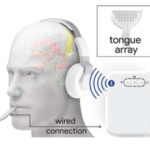September 10, 2014 – I have a personal interest in the body’s autoimmune response. I’m allergic to mango and before that showed an allergic response to wasp stings. I have carried an epipen in the past and have had three anaphylactoid reactions in my lifetime. Fortunately I have managed to overcome these incidents and today no longer react to wasp venom. That’s what so surprising about our immune system. Sometimes it triggers a response that can kill us and then it never happens again. Even my mango allergy may have been a two-time event that may never reoccur according to the immunologist with whom I consulted. Nevertheless I stay away from Thai salads and anything suspiciously orange in desserts, drinks and mixed foods. And when I travel to resorts and go to restaurants where mango is on the menu I always alert my server to my mango autoimmune reaction.
But my wife also suffers from an autoimmune disease which causes her to breakout in hives when subjected to any pressure exerted on her skin. These appear within a few minutes to a few hours after exposure and can last several days before resolving. They are painful and disfiguring. She takes an experimental drug that only recently was approved for treating hives. It’s brand name is Xolair and it is classified as a biologic and administered by injection. She carries an epipen just in case she has an allergic reaction to the drug, not to her autoimmune disease.
And then there are much more serious autoimmune diseases such as multiple sclerosis, arthritis, and lupus. Previously I wrote about curing autoimmune diseases on this blog site. Check out the list I put together. It is far longer than you could imagine.
Which brings me to the subject of this story, the discovery by researchers from the School of Cellular and Molecular Medicine at the University of Bristol, in the United Kingdom, of a way to stop the body’s autoimmune response from attacking healthy tissue. The research appears in the September 3rd issue of Nature Communications in a paper entitled Sequential transcriptional changes dictate safe and effective antigen-specific immunotherapy.
What the Bristol researchers found was a way to reinstate immunological tolerance without compromising the immune response. They selectively targeted cells responsible for autoimmune disease and converted them into cells functioning to protect against the disease. This in effect is allergic desensitization, the same method and approach allergists use to correct the body’s response to an irritant, by exposing the person suffering from the disease to fragments of proteins normally the target of the autoimmune attacks and gradually increasing the dosage.
The research looked inside immune cells to discover the genes and proteins that turn on and off during treatment and this led them to discovering a way to convert aggressive autoimmune responses into protective ones. The end result, the restoration of a normal autoimmune response with the immune system no longer attacking the body in which it operates.
This discovery may lead to effective treatments that no longer require immunosuppressive drugs like Xolair or Cyclosporin. The biotechnology company, Apitope, a spinoff of the University of Bristol, is developing the treatment for clinical trials.
What further implications are for this discovery? For example, can immunological tolerance treatments similar to allergy shots be used for those who currently take immunosuppressive drugs after receiving an organ transplant?


















